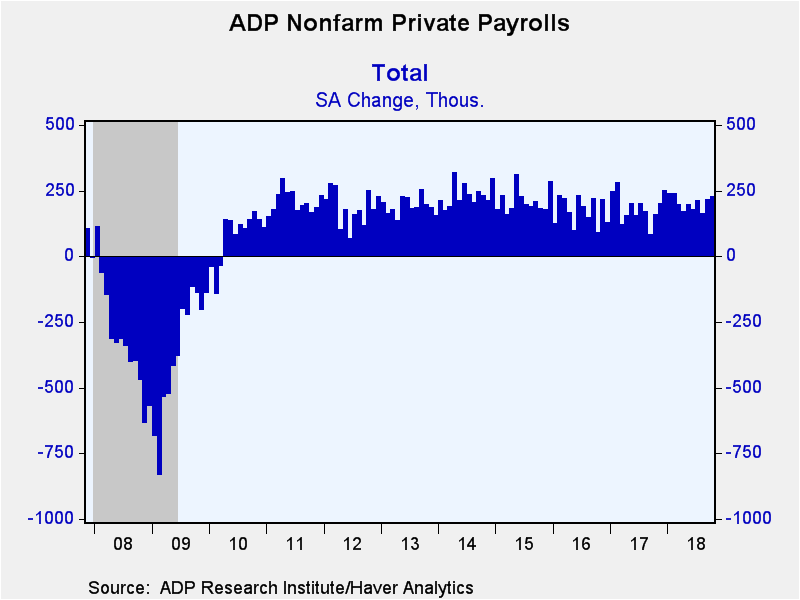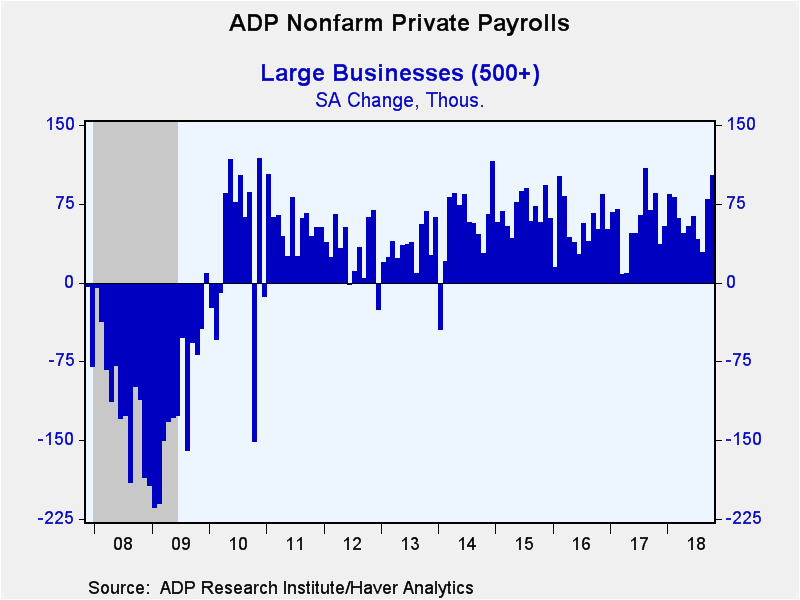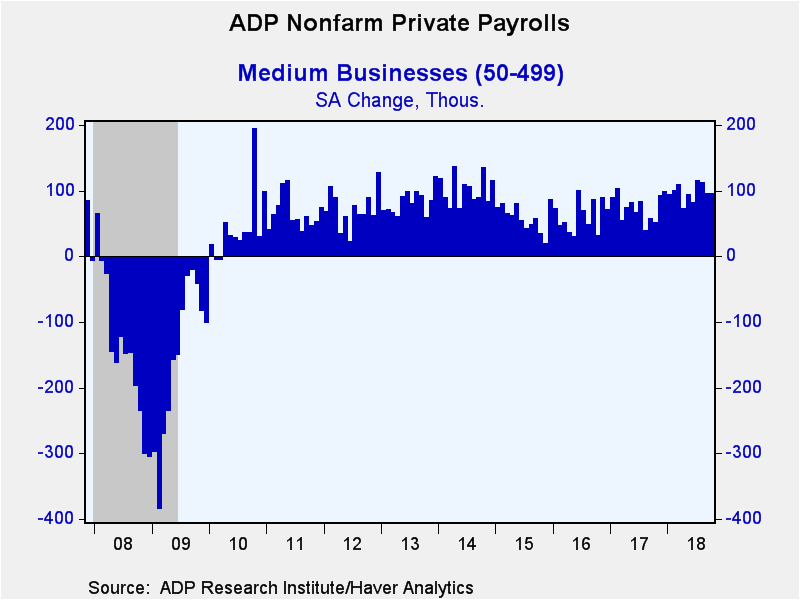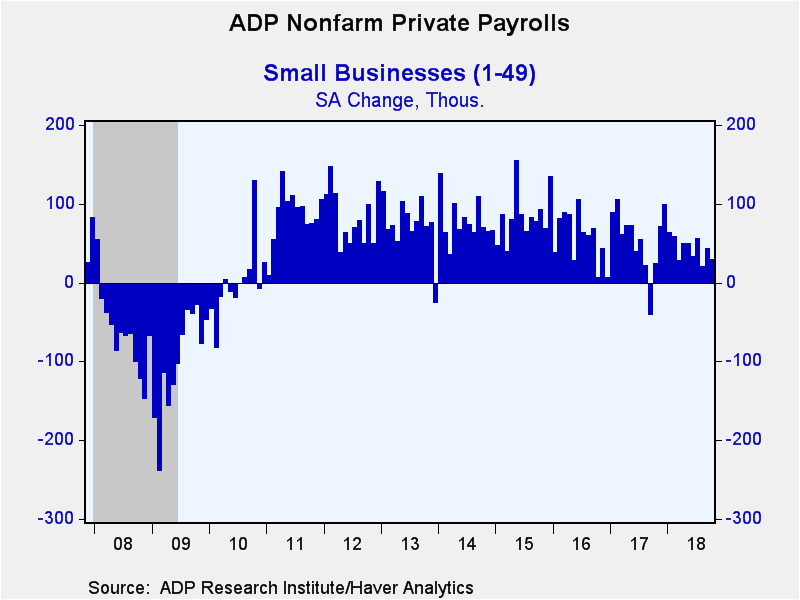 Global| Oct 31 2018
Global| Oct 31 2018U.S. ADP Private Sector Payrolls Remain Firm
by:Tom Moeller
|in:Economy in Brief
Summary
The ADP National Employment Report indicated that private nonfarm payrolls increased 227,000 (2.0% y/y) during October following a 218,000 September rise, revised from 230,000. Expectations had been for a 185,000 gain in the Action [...]
The ADP National Employment Report indicated that private nonfarm payrolls increased 227,000 (2.0% y/y) during October following a 218,000 September rise, revised from 230,000. Expectations had been for a 185,000 gain in the Action Economics Forecast Survey. So far this year, private nonfarm payrolls rose 204,000 on average per month versus a 185,000 average during 2017. During the last ten years, there has been a 96% correlation between the change in the ADP figure and the change in nonfarm private-sector payrolls as measured by the Bureau of Labor Statistics.
The ADP National Employment Report is calculated from ADP's business payroll transaction system covering 411,000 companies and nearly 24 million employees. The data is calibrated and aligned with the Bureau of Labor Statistics establishment survey data and is produced by the Automatic Data Processing Research Institute in collaboration Moody's Analytics Inc. The ADP data only cover private sector employment.
Small business payrolls expanded 29,000 (1.2% y/y) following a 43,000 rise. The three-month average gain declined to 31,000 from a January high of 78,000. Medium-sized payrolls gained 96,000 (2.6% y/y) and a fairly steady 101,000 on a three-month basis. Large payrolls increased 102,000 (2.6% y/y) and strengthened 70,000, on average, during the last three months.
Growth in goods-producing payrolls slipped to 38,000 (2.5% y/y) this month, but growth was steady at 29,000 on a three-month basis. Construction sector payrolls rose 17,000 (3.3% y/y) which was little changed from its three-month average. Mining sector payrolls grew a slightly weaker 4,000 (7.7% y/y).
Private service sector payrolls advanced 189,000 (1.9% y/y), the strongest increase in nine months. Improvement was led by a 61,000 rise (1.4% y/y) in trade, transportation & utilities which was the strongest increase in four years. Leisure & hospitality jobs rose a modestly improved 40,000 (2.2% y/y). Professional and business services payrolls rose a slightly lessened 36,000 (2.7% y/y) while education & health services jobs gained 31,000 (2.1% y/y), roughly half the monthly increase averaged in 2016. Information sector employment rose 4,000 (0.1% y/y) following declines in the prior five months. Financial services sector jobs also improved 4,000 (1.5% y/y), down from double-digit gains in each of the prior three months.
The ADP National Employment Report data can be found in Haver's USECON database; historical figures date back to April 2001 for the total and industry breakdown, and back to January 2005 for the business size breakout. The expectation figure is available in Haver's AS1REPNA database
| ADP/Moody's National Employment Report | Oct | Sep | Aug | Oct Y/Y | 2017 | 2016 | 2015 |
|---|---|---|---|---|---|---|---|
| Nonfarm Private Payroll Employment (m/m chg, 000s) | 227 | 218 | 162 | 2.0% | 1.8% | 1.9% | 2.3% |
| Small Payroll (1-49) | 29 | 43 | 21 | 1.2 | 1.3 | 1.9 | 1.9 |
| Medium Payroll (50-499) | 96 | 96 | 112 | 2.6 | 1.9 | 1.5 | 2.3 |
| Large Payroll (>500) | 102 | 79 | 29 | 2.6 | 2.3 | 2.7 | 3.0 |
| Goods-Producing | 38 | 48 | 2 | 2.5 | 1.5 | 0.8 | 2.0 |
| Construction | 17 | 33 | -14 | 3.3 | 3.1 | 4.3 | 5.3 |
| Manufacturing | 17 | 10 | 15 | 1.7 | 0.7 | 0.2 | 1.2 |
| Service-Producing | 189 | 170 | 160 | 1.9 | 1.8 | 2.2 | 2.3 |
Tom Moeller
AuthorMore in Author Profile »Prior to joining Haver Analytics in 2000, Mr. Moeller worked as the Economist at Chancellor Capital Management from 1985 to 1999. There, he developed comprehensive economic forecasts and interpreted economic data for equity and fixed income portfolio managers. Also at Chancellor, Mr. Moeller worked as an equity analyst and was responsible for researching and rating companies in the economically sensitive automobile and housing industries for investment in Chancellor’s equity portfolio. Prior to joining Chancellor, Mr. Moeller was an Economist at Citibank from 1979 to 1984. He also analyzed pricing behavior in the metals industry for the Council on Wage and Price Stability in Washington, D.C. In 1999, Mr. Moeller received the award for most accurate forecast from the Forecasters' Club of New York. From 1990 to 1992 he was President of the New York Association for Business Economists. Mr. Moeller earned an M.B.A. in Finance from Fordham University, where he graduated in 1987. He holds a Bachelor of Arts in Economics from George Washington University.
More Economy in Brief
 Global| Feb 05 2026
Global| Feb 05 2026Charts of the Week: Balanced Policy, Resilient Data and AI Narratives
by:Andrew Cates










